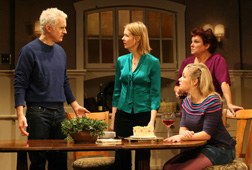
Lucy Komisar
 |
| RABBIT HOLE -- John Slattery, Cynthia Nixon, Mary Catherine Garrison, Tyne Daly. Photo by Joan Marcus. |
"Rabbit Hole"
Written by David Lindsay-Abaire, Directed by Daniel Sullivan.
Biltmore Theatre, 261 West 47th St.
212-239-6200.
Opened Feb. 2, 2006.
Reviewed by Lucy Komisar Feb. 3, 2006.
Closes March 26, 2006.
http://www.mtc-nyc.org
The quiet sorrow that is wrenching two souls under the surface pops up in odd ways, like when Becca slaps a woman in a supermarket aisle, because she doesn't give her child fruit loops, or when calm Howie suddenly goes to pieces, because Becca has accidentally erased a video tape of their dead son. They are psychologically unmoored by the accidental death of Danny, who eight months earlier chased their dog into the street and was hit by a car.
David Lindsay-Abaire's play about the grief of losing a child is a look into what appears to be a bottomless abyss of permanent, all-encompassing mourning. It's also an obvious message about how slipping into isolation only makes things worse. And about how loss ought to be understood in the continuum of previous loss and new life. These are not original observations, but under the clear, unsentimental direction of Daniel Sullivan, they do not appear trite. He unfolds a drama, not a melodrama.
Curiously, for a play about death and sorrow, I never found a tear on my cheek. The mood of the play is cool and controlled. Becca (Cynthia Nixon) is emotionally restrained, bottling everything up and eschewing emotional connections. She had worked for Sotheby's, which is perhaps where she got her ultra-waspish control. Howie (John Slattery) wants to restore some normalcy, tenderness, by restarting their sex life. But Becca is strung out, on edge. She can't connect. Nixon gives you the sense of a quietly ticking time bomb.
Later, you discover that Howie is also distraught. He accuses her of trying to get rid of the evidence Danny was there, of erasing him. And you see that, curiously, their opposite ways of dealing with the tragedy is making things worse. He wants to have reminders of Danny around; she wants them banished. And they can't communicate or comfort one-another. Ironically, Howie's job is risk management analysis, but he can't deal with the risk to his own marriage.
Both of them seem to be repressing their feelings, unable to connect or comfort each other. John Lee Beatty's beige wood upscale Larchmont, N.Y., house, with loveseat, leather chair and ottoman, and fireplace in the living room and the appropriate cabinetry in the modern kitchen, is as cool and restrained as the couple.
The play imagines the anguish of a parent's worst nightmare. But it also puts the tragedy in the context of all parents and children. Children have died and will be born again. Becca's mother, Nat (the irrepressible Tyne Daly) had a drug addict son who 11 years earlier hung himself. When she brings it up, Becca tells her it's not the same. To a mother it is.
Daly, the acting star of the show, draws out the rich complexity of a gruff, overweight woman who on the one hand jokes, "Are stretch-mark lotions only for pregnant women, or can anyone use them?" but also patiently seeks to draw her daughter back to life.
In her wonderfully comic New York accent, Nat muses about the tragic deaths of the rich. The Kennedys, for example, were always flying planes or doing other dangerous things that rich people do. She recalls that Aristotle Onassis died a few years after the plane crash death of his son, because he couldn't come to terms with it. "People want things to make sense."
Becca's sister, the flaky, irresponsible 20-something Izzy (Mary Catherine Garrison), turns mature and sensitive after she gets pregnant by her musician boyfriend, Augie. Suddenly, Izzy, who can't keep even a fast-food service job, tries to help her supposedly wiser sister cope. Maybe being a mother-to-be gives her new insights. Nat and Izzy represent life past and life future.
But there's also life now. Jason (John Gallagher Jr.), the high school senior who drove the accident car, is distressed and comes to apologize, perhaps even to give the couple someone to blame. Gallagher is excellent as the unsophisticated, but wise teen. The discomfort he radiates as he sits on the couch not knowing what to say is palpable.
Do people who die just disappear down a "rabbit hole"? Rarely, the author reminds us. It's a useful sentiment for audiences to ponder.